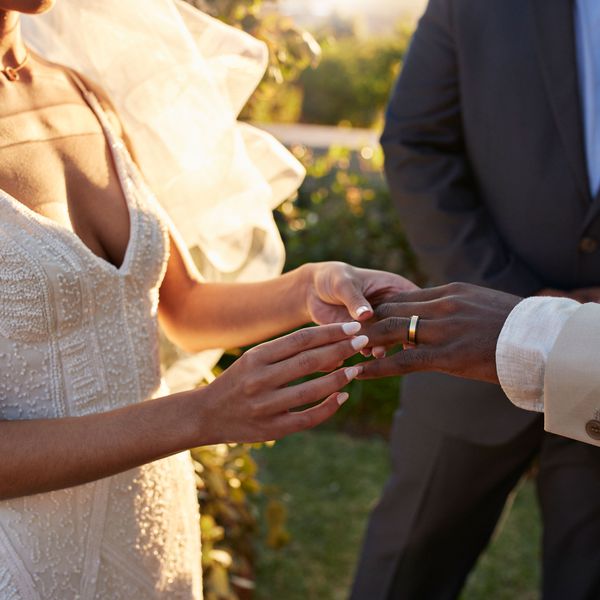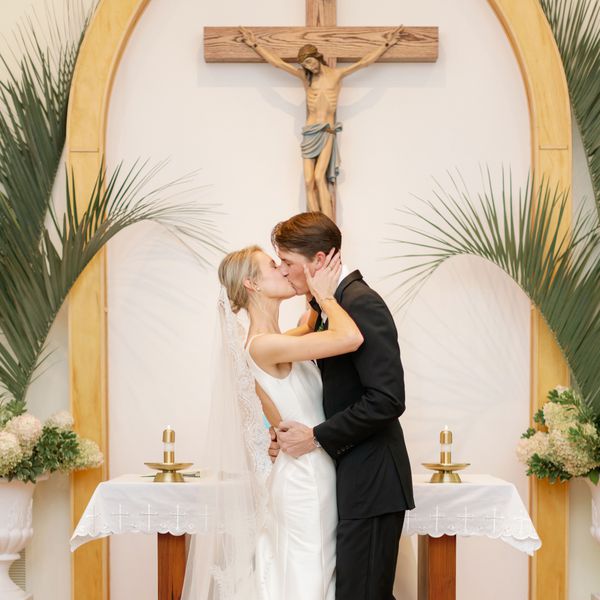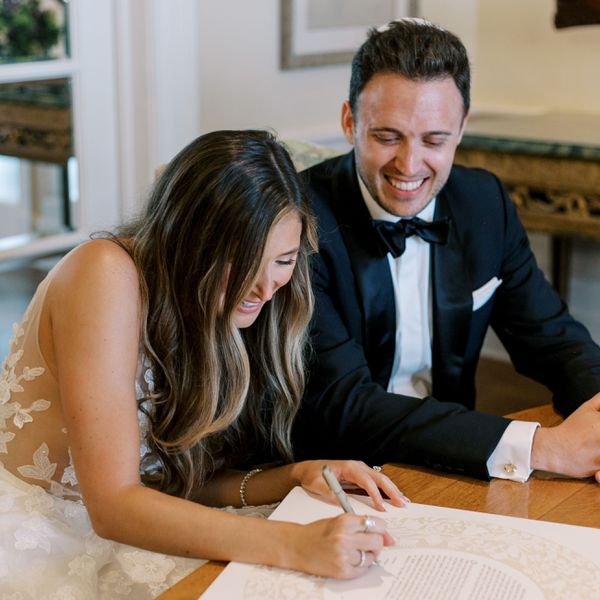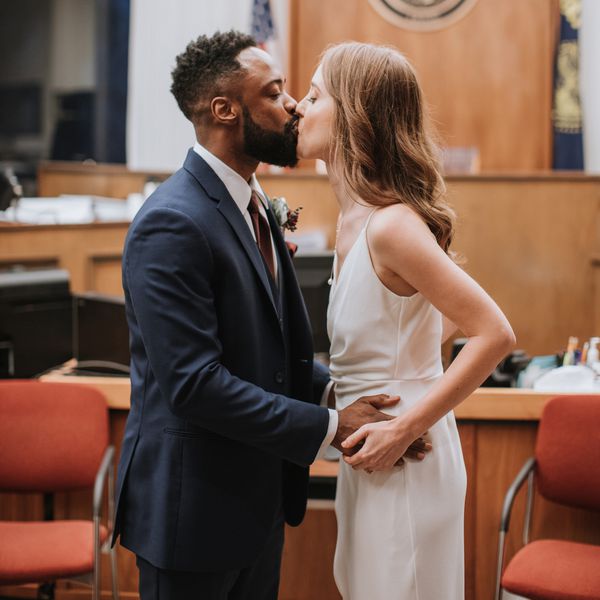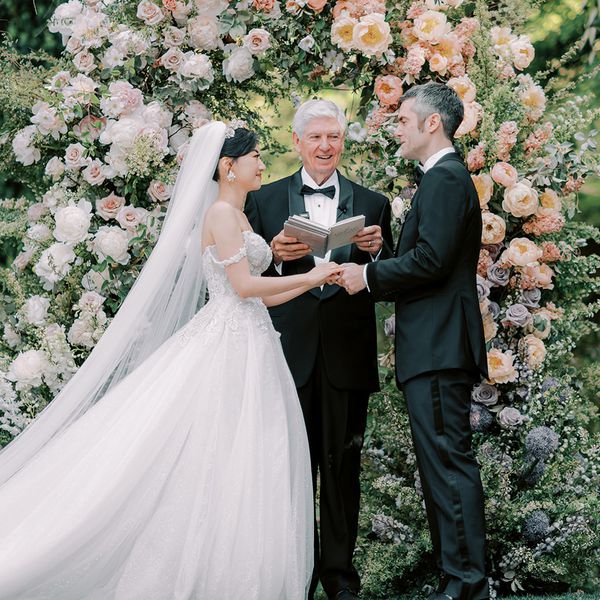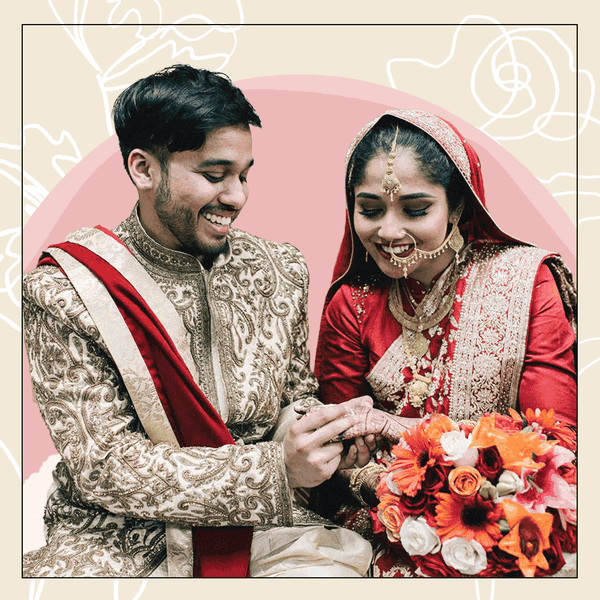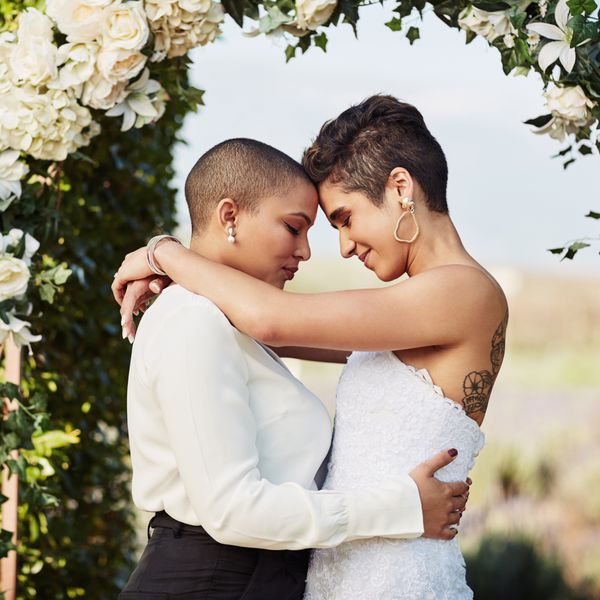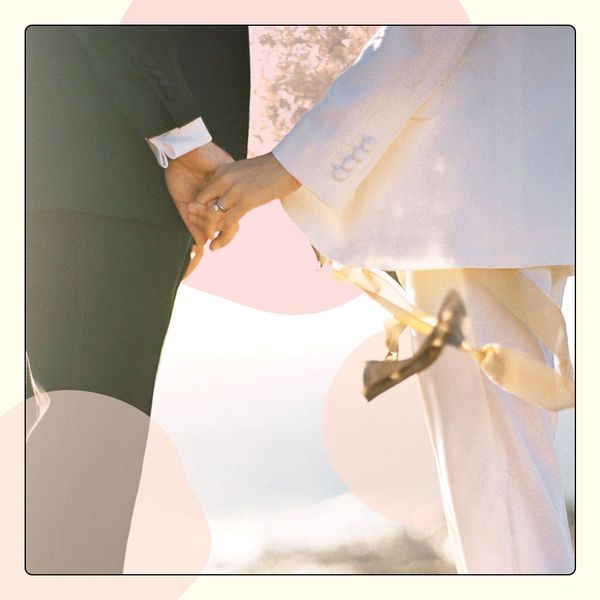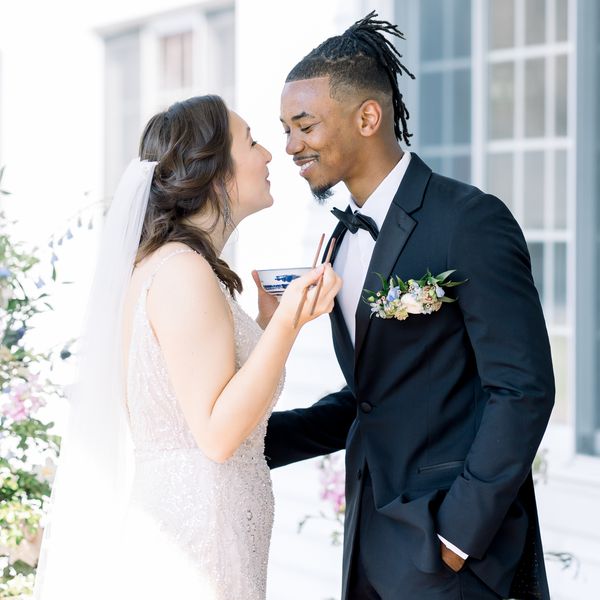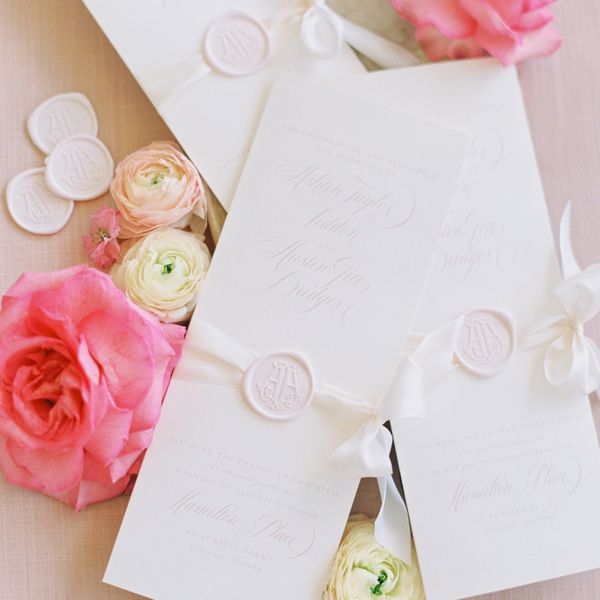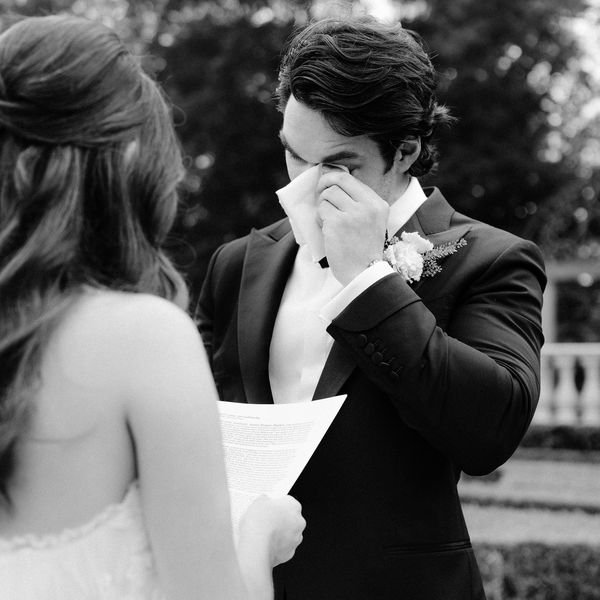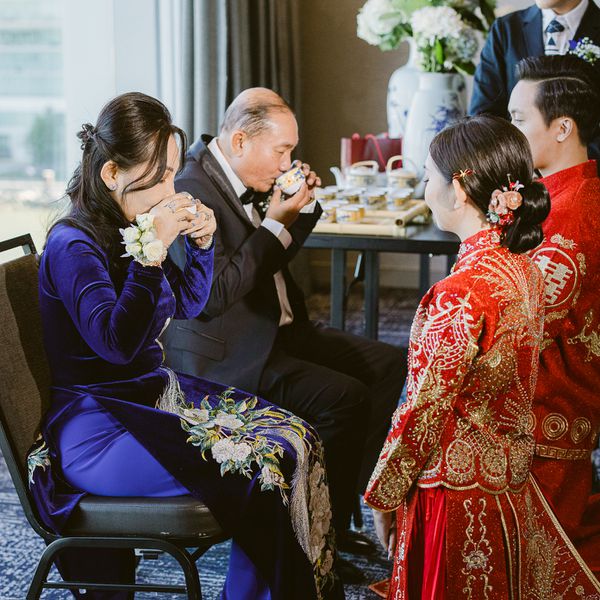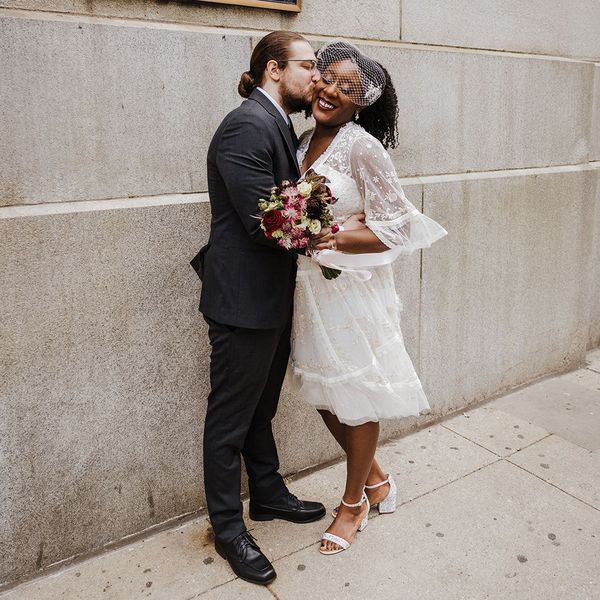:max_bytes(150000):strip_icc()/Non-Religious-Wedding-Officiant-Jana-Williams-Photography-Main-fcf37eea279046dd8bf14d256cd0c8c4.jpg)
Photo by Jana Williams Photography
Your wedding ceremony is one of the most important parts of your big day. It's the moment when you and your partner stand before family and friends, exchange vows, and officially become newlyweds. It's also a time when all eyes will be focused on you, and, you guessed it, your wedding officiant—which ultimately means that finding someone to legally marry you is a decision that shouldn't be taken lightly. While most traditional ceremonies are led by a religious or spiritual leader, for those hosting a secular event, you'll likely want to hire a non-religious wedding officiant to lead this special moment.
“A non-religious or ‘secular’ wedding officiant can be either a professional vendor or a family member or friend of your choice,” explains owner and lead planner of To Be Loved Events, Samantha Kin. “With a professional, typically, this looks like a hired celebrant/civil officiant or a judge or other government official. With a family member or friend, this can be anyone you deem fit for the important position, normally a very close friend you both trust or, often, a parent or close relative.” What's more, a secular officiant enables you to have more creative freedom with your ceremony, allowing you to incorporate more of your love story into your big day for an inclusive and personal event.
Meet the Expert
Samantha Kin is the owner and lead planner of To Be Loved Events, a wedding and special events planning agency.
If you’re considering hiring a non-religious wedding officiant, read on to learn more about this important process and the benefits of this option.
The Benefits of Choosing a Non-Religious Wedding Officiant
The type of officiant couples choose for their wedding day really comes down to their personal preferences. That being said, there are a few benefits to selecting a secular person, especially for those who don't plan to host a religious celebration.
According to Kin, many couples gravitate toward non-religious officiants as it can “give them more flexibility and personalization within their ceremony." This is particularly helpful for those who don’t identify with a specific faith or religion. “These couples may want a more non-traditional ceremony that speaks more specifically about the couple's own values and their love story,” she explains. Similarly, hiring a non-religious wedding officiant allows couples to "add their own personal touches, like maybe a special poem or reading significant to them," notes Kin. Other options include unity rituals, such as a knot-tying or sand ceremony.
Another benefit? Ceremonies led by a non-religious wedding officiant are typically more inclusive. “Secular ceremonies lend themselves to be more inclusive in nature and open the door to anything you'd like to include in your program,” Kin notes. “I would say ‘rules’ are much more limited.”
:max_bytes(150000):strip_icc()/Jenn-Andy_21-5a86d3f5a2b64c3db5f3dbe821c8a13a.jpg)
Photo by Kaley From Kansas
How to Select a Non-Religious Wedding Officiant
“The first step to finding the best non-religious officiant for you would be to decide if having a professional or a personal member will be right for you,” says Kin. “From a wedding planner's perspective, I typically recommend hiring a professional due to ease when it comes to public speaking, knowing what should/could be included, and overall experience with performing ceremonies for the best ceremony possible for couples.”
For couples taking the professional route, Kin recommends researching potential officiants and getting referrals from other wedding vendors you have already hired. She also notes that you’ll want to read plenty of reviews before narrowing down your options to two or three people to interview. “When narrowing your search, think about your preferences when it comes to personality, humor, budget, style, their experience, how they work and their process, and their options for customizations,” Kin explains.
If you choose a friend or family member, however, make sure to thoroughly discuss the ceremony with them and have several practice runs. This way, both you and the chosen officiant understand the direction of the ceremony and can work out any kinks before the big day.
Ultimately, when making your final decision, Kin suggests taking the experience and personality of the officiant, as well as your preferred ceremony style, into consideration. “If you happen to be torn between two options, my best advice would be to choose who you feel most comfortable talking to and who makes your wedding feel special like you are their top priority,” she says.
:max_bytes(150000):strip_icc()/TL-316-3cdd7ac1616e4e16baee8d4f03274a5e.jpeg)
Photo by Grace Gatto Photography
Additional Tips for Choosing the Right Non-Religious Wedding Officiant
While choosing an officiant can be a different process for every couple, for those going with a professional, here are a few additional tips that'll help you with the selection process.
Think About Your Wedding Vision
Before talking to potential officiants, you should have a loose idea of the overall vibe of your wedding and, more specifically, your ceremony. “When booking your officiant, I think it's good to know where and when your wedding is and the overall style of the event, but don't feel like you need to have your entire wedding vision down before talking to potential officiants,” says Kin. “For example, if you know you're planning to have a very formal black-tie wedding, then maybe your ceremony should be a bit more formal and structured as well. However, that is still completely up to you, and your ceremony should reflect your love story above all else.”
Interview Multiple Candidates
As you search for potential candidates, you may feel drawn to a specific person, but it’s always a good idea to explore your options before settling on one individual. “When booking your officiant, I absolutely recommend interviewing at least three potential candidates,” explains Kin. “Even if you are drawn to the person after interviewing the first one, it is always a good idea to interview others to give you other good ideas, see how different people work, and maybe think of things or questions you hadn't thought of before. Interviewing others can also be reassuring that you are choosing the right one for you.”
If you’re having difficulty coming up with questions to ask your candidates, here are a few potential questions Kin recommends asking during the interview process:
- How many weddings have you performed?
- What is your process like for writing a custom ceremony script?
- Are there any limitations to what we can include in our script?
- How would you describe your personality and style?
- Will you help us obtain and file our marriage license?
- Will you attend and lead our ceremony rehearsal?
Spend Time With Your Chosen Officiant
Once you’ve picked your officiant, it’s important to spend some face-to-face time with them, especially if you conducted your interviews virtually. This will help you get to know each other before the wedding, which will naturally allow for a more personal ceremony. Kin says, “This will give your ceremony a wonderful personal touch when your officiant has more insight into who you both are as individuals, as a couple, and through your love story.”
In all, choosing the right non-religious officiant will depend on who will make your ceremony the most personal for you and your partner. “Make sure to choose someone you trust and who ultimately will take the role seriously,” explains Kin. “Whether a professional or not, you want your ceremony to feel well rehearsed and go off seamlessly, for it's a memory you'll want to remember fondly forever."
